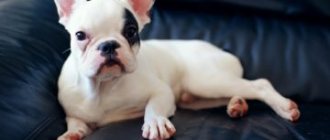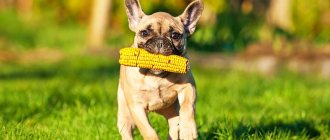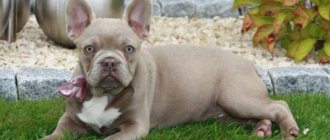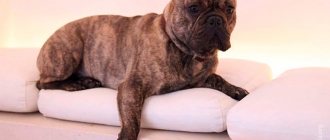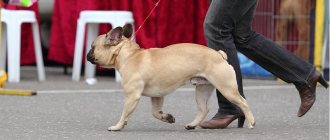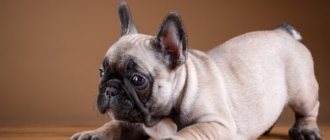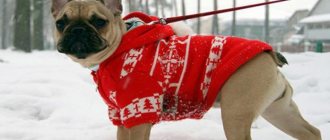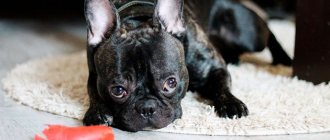Unlike most other Molossians, French Bulldogs are not large in stature. But it would be wrong to consider them a frivolous or, especially, a decorative breed. Indeed, despite his small stature and good-natured appearance, The French are quite strong and their character contains traits characteristic of their ancestors - real poisoning dogs, which were used to hunt large animals.
Physical activity
French bulldogs love to play and run without a leash. But when going for a walk with such a pet, it is necessary to take into account the breed characteristics of dogs of this breed. Like all brachycephalics, the “Frenchies” have a short, wide muzzle, which is why they have a limited reserve of stamina. Such a dog can run for a short time or play outdoor games, but long runs in a park or stadium are not for it.
Great physical activity in the summer poses a particular danger for the “French”. Due to the typical muzzle structure of brachycephals, they already have a hard time in the summer, and if the pet also runs outside in the heat, then it may develop serious problems with the respiratory or cardiovascular system.
In addition, French bulldogs should not jump over obstacles, as they have a breed defect such as an additional hemivertebra. Sometimes even several of them can develop, and this significantly increases the risk of back injury or even a spinal cord herniation. Also, when walking and playing outdoors, you should stay away from bushes. After all, due to the fact that French bulldogs have rather bulging eyes, the dog can injure them on branches.
French bulldog puppies under one year of age should not be overly loaded or, especially, put on harnesses with weights.
The best exercises that perfectly develop your pet's muscles are climbing a gentle hill or stairs. And if the owner is absolutely sure that his dog does not have additional hemivertebrae, jumping to low heights can also be added to these activities. During a walk, it will also be useful to throw a ball or other toy so that the dog will run after it. However, it is necessary to monitor the bulldog’s condition and when the first signs of fatigue appear, you need to give him a rest or return home with him.
Content
- The main character traits of the American Bulldog: female or male?
- American Bulldog Personality
- Basic commands
- Raising a dog
In this article you will learn what features of character and behavior are inherent in the American Bulldog. After studying this information about the temperament and disposition of the American Bulldog at different ages, get an idea about the breed. Find out how the character of a bitch differs from the behavior of a dog. We hope our article will help you figure out which gender of puppy is best for you.
Need for communication
French bulldogs are very sociable and sociable pets . They love it when everyone in the family plays with them and feel best when they become the center of everyone's attention. They rarely conflict with any people, but they can be quite jealous of pets.
Bulldogs very sensitively sense the mood of their owners and if they are not inclined to play or communicate, they will not annoy them or impose their company. In relation to other pets, these dogs often behave selfishly. Even if they are tired or sick, and the bulldog at this time wants to play with them, he will stubbornly drag them into his entertainment against their wishes and physical capabilities.
The French can be sweet and playful, but at the same time they require increased attention and respect.
French bulldog color
The coat tones of these dogs are quite varied. There are monochromatic individuals, often born fawn, brindle, or simply with scattered spots. The most fashionable color now is the blue French bulldog. This is a very noble gray tone with a bluish undertone. Beige, white, cream, and black French bulldogs are also held in high esteem.
Loyalty to the owner
Like all other molossoids, French bulldogs are characterized by exceptional devotion to their owners. Having become attached to someone with their soul and all their small, but faithful and brave hearts, these dogs will be faithful to this person until the last minute of their lives. They will miss their owner when he goes to work or study, and upon his return he will be greeted as joyfully as if he had spent many years apart from his owner.
These dogs do not take well to foster care or living in a dog boarding house, and they also do not like to be left alone.
Bulldogs are so sociable that they are ready to accept signs of favor towards their person not only from their owners, but also from guests who come to the house, or from passers-by on the street. Not all owners like this attitude towards strangers, and some owners of “Frenchies” even consider their dogs “traitors.” But, in fact, the bulldog still values his owner very much. Simply, the desire to be in the center of attention makes him very open to communication with strangers.
Character and habits
The French Bulldog is not one of those dogs that will spend whole days on a bed. These small but brave dogs love movement and active games, and they can also get bored playing alone. Therefore, they try to constantly be the center of attention and are very happy when there is a person who wants to play with them. Bulldogs are very attentive and caring in their own way towards their owners.
By subtly sensing their mood, the dog understands when a person feels lonely or bored. In this case, the “Frenchman” will definitely approach him and try to entertain or calm him down. If the owner is busy with some important matter that requires concentration, the dog will not distract him, but will wait patiently until the owner can pay attention to it.
However, bulldogs can be quite selfish. They are able to remember undeserved insults for a long time and, on occasion, can even take revenge. You should not use brute force or shout at them: in this case, the “Frenchman” may become embittered and become stubborn or aggressive. If the owner is ready to pay attention to the pet, is truly happy to communicate with him and at the same time treats the animal with respect, then the French bulldog will become a true friend for him, and, if necessary, a protector.
French bulldogs are ideal pets for a single person or a family with children.
Intelligence
French Bulldogs are smart enough to understand commands they learn. But they are in no hurry to carry them out as soon as they hear them. And the point here is not stubbornness or, especially, harmful character. Simply, this breed was bred not as a service breed, but as a companion, focused primarily on communicating with the owner.
One of the main qualities that confirms the high intelligence of the “French” is their unique sense of humor, which is why they are often called “the clowns of the dog world.”
Even the fact that these dogs bark only out of necessity, when, for example, they need to draw the attention of their owners to something, is a sign that they are characterized by intelligence and intelligence. Yes, the French Bulldog will never make a working dog that flawlessly follows commands as soon as it hears them. But on the other hand, he perfectly knows how to understand life situations and, in accordance with this, builds his behavior and full communication with people.
Color variations
All colors of French bulldogs can be divided into two main categories - uniform and spotted.
And these categories, in turn, can be divided into three groups:
- Brindle - can be red-brown, red and black. This color is characterized by areas with stripes of black or red hair. There may be white markings on the chest, neck and muzzle. Sometimes there is a barely noticeable mask.
- Fawn - varies from red to light wheaten, rarely, but light beige is still found. The base color is combined with a white belly and markings on the chest and neck.
- Spotted - the main color is always white. It has spots of a tiger or field shade on the head, neck, ears, sides and back.
NOTE!
In addition to the main colors, bulldogs have black and white and cream colors, which have also been adopted by the international American standard.
Features of the breed and attitude towards children
French Bulldogs are known as dogs that are great with children of all ages. If a pet of this breed ends up in a family where there is already a child, as a rule, no problems arise with building relationships between younger family members. However, if a baby is born in a family where a bulldog already lives, the situation may turn out differently.
The appearance of a child in a family in itself disrupts the usual rhythm of life for a “Frenchman”. And if you consider that the baby demands the attention of the dog’s adored owners and constantly cries, it is easy to understand that the dog is not at all happy with such changes in life. French bulldogs are very friendly and affectionate towards their owners. They are also tactful and delicate so as not to harm the newborn.
But at the same time, representatives of this breed are quite conservative and not without selfishness. Therefore, it is necessary to try to devote time not only to the child, but also to the dog. The bulldog, seeing that he is still dear to his owners, will eventually get used to the baby and love him just like all other family members. It is very important to take into account that representatives of this breed are jealous and demand respect for themselves. But small children who do not understand the difference between a toy and a live dog may accidentally hurt the dog or scare it with loud screams. And in this case, the “Frenchman” may intuitively show aggression and snap at the baby.
Parents need to supervise young children while they play and interact with their pet.
You should not allow a child to accidentally, or, especially, intentionally, offend an animal, or take away its toys. In addition, it is very important to explain to children that they should not touch the dog when it is eating or resting. When a French bulldog communicates with older children, another problem may arise: the dog may become overtired during too active games with them.
Therefore, it is necessary to explain to children that they cannot force a dog to run until exhausted or to walk with it for a long time on the street in the heat. If a child does not tease or pester the bulldog too much, if he treats the pet with care and respect from an early age, then the “Frenchman” will become his most faithful and devoted friend, ready for his little master, if not to do everything, then to do everything. much.
Does he get along with other pets?
All animals arouse genuine interest and curiosity in the Frenchman, and natural contact and fearlessness make him make acquaintance first.
They get along well with cats, they can sleep peacefully on the same bed and eat from the same bowl, and in the absence of their owner they often go on funny chases..
As for other dogs, friendship is more likely to happen with a member of the opposite sex. Bitches and males often sort things out among themselves and fight for primacy.
Security qualities
A French bulldog can become a good guard for an apartment . Indeed, despite its small size, it is fearless, and its hoarse bark, reminiscent of the voice of a large dog, can scare off an intruder who encroaches on the safety of the owner or the safety of his property. Bulldogs are not inclined to bark at the slightest noise, and if an intruder decides to break into the house, most likely, the dog will not waste time barking at him, but will immediately try to bite.
At the same time, in ordinary life the “French” are not at all malicious. They will never attack passers-by on the street or guests who come to the house. These dogs understand perfectly well when aggression is appropriate and when such actions should be refrained.
French bulldogs do not know how to correctly assess the degree of danger and often get into fights with larger dogs or other obviously stronger opponents.
Therefore, the owner, if he is nearby at the time of the conflict and sees that the pet can be seriously injured in a fight, needs to intervene and stop him.
Animal breeding
The body structure of male dogs makes natural insemination of a female dog problematic, so for greater guarantee, breeders often resort to artificial insemination.
Due to the puppies' disproportionately large heads and narrow hips, Frenchie bitches are rarely able to give birth on their own; more often they require a caesarean section.
It would not be superfluous to conduct an ultrasound to clarify the number of puppies and their location. It is especially important to know this if labor attempts stop and dead puppies remain in the uterus.
Pregnancy lasts about 63 days, sometimes labor begins earlier or later.
IMPORTANT!
Lack of help during contractions that suddenly begin can lead to the death of the bitch.
Characteristics of the breed, pros and cons
French bulldogs are calm and friendly. They relate well to people, are moderately active and playful. In addition, these dogs are sensitive and attentive towards their owners, which makes them ideal pets for older people and families with children. However, like all other breeds, Frenchies have both positive and negative qualities and problems.
The main advantages of the breed include:
- Compact size and the fact that these dogs do not need a large living space. That is why the bulldog feels quite comfortable even in a small apartment.
- Ability to adapt to different living conditions. A “Frenchman” can live both in a metropolis and in a country house.
- He will make an excellent companion for a lonely elderly person who is ready to devote all his time and attention to him, but he will also be no less happy in a large large family.
- Bulldogs by nature have a protective instinct, thanks to which such a dog can become a good watchman.
- They are not noisy: they bark only when necessary.
- They get along well with children and love to play with them.
- They are smart, intelligent and quite obedient.
- The “French” have a sense of humor: they are not averse to amusing their owners with hilarious grimaces or funny antics.
- Bulldogs, as a rule, subtly sense the line separating cheerful mischief from sabotage or outright disobedience and try not to cross it.
The disadvantages of this breed are the following:
- They cannot tolerate extreme heat, which is why they have to limit physical activity in the summer.
- They are subject to outbreaks of activity, during which obedient and well-mannered pets can turn into an uncontrollable “hurricane”, demolishing everything in its path.
- They remember grievances for a long time, and on occasion they can take revenge.
- They do not tolerate rude and disrespectful treatment.
- If a bulldog is caused discomfort or, especially, pain, he may instinctively bite.
- They do not tolerate loneliness very well, therefore, the French Bulldog is not the best choice for too busy people.
- Not all owners like their excessive desire to communicate with all passers-by or guests who come to the house.
- Due to reckless courage and inability to assess the strength of the enemy, he can seriously suffer in a fight with a large dog.
- If raised incorrectly, he grows up stubborn and lazy.
When training a French bulldog, it is necessary to get your pet to obey commands, even if not immediately.
If you allow the dog to fail to do what is required even once, the French Bulldog may decide that it is okay to continue to do so. As a result, the dog may become stubborn and completely stop obeying the owner.
Distinctive features
According to the standard, the breed can be described as follows:
- The head is large in size, with folds and wrinkles. There is a furrow between the eyebrows. The back of the head is not too prominent and there is a clear transition from the forehead to the muzzle. The bones of the upper jaw and nose are shortened.
- The muzzle is snub-nosed with an extended dark lobe. It is because of this structure that the breed often experiences breathing difficulties.
- lips are fleshy, slightly drooping, and black in color. They close in the middle and hide their teeth behind them.
- The jaws are strong, the lower one is pronounced and slightly moved forward.
- The eyes are large, round, outlined.
- The ears are medium in size, round, thin, wide at the base.
- The neck is short but muscular and slightly arched.
- The body has a slight rise from the withers to the hind legs - which is typical for this breed.
- The back is massive and strong.
- The chest is deep and cylindrical in shape.
- The abdomen is toned, without sudden changes.
- The tail is short, set low with a tapered end.
- Forelegs with short forearms.
- The paws are shaped like a cat's - round, with claws connecting to each other.
- The hind limbs are more developed, have pronounced muscles, and are positioned more vertically.


